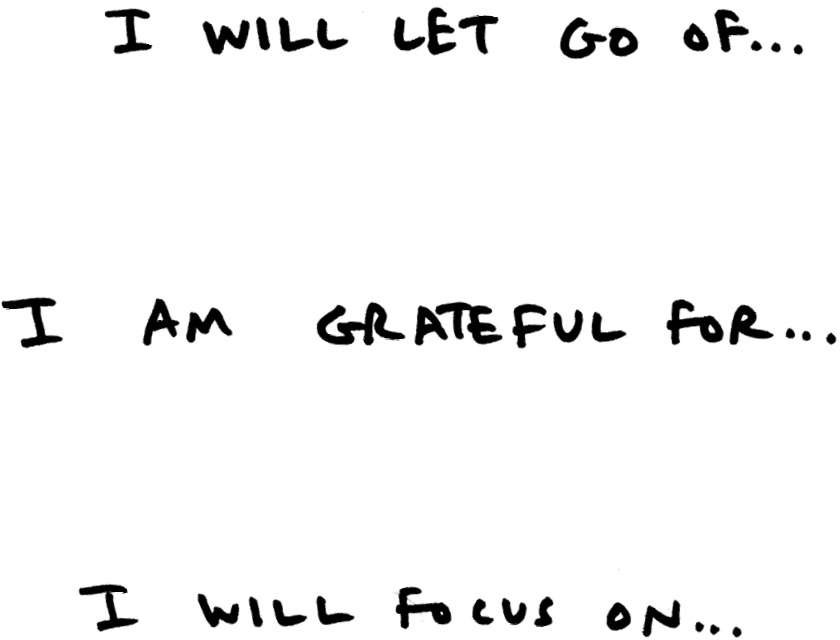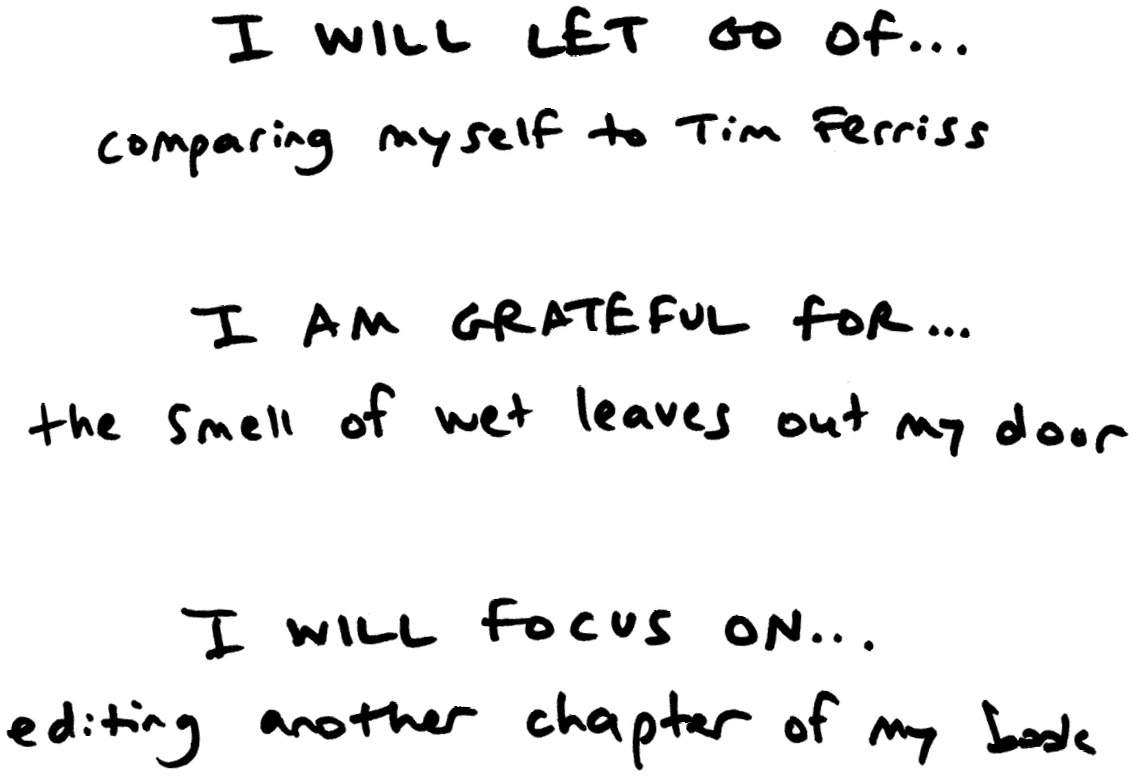3 The two-minute morning practice
We must reveal to heal.
This is how we process things, tell ourselves we’re okay, tell ourselves we’re moving forward, and yes, tell ourselves we’re awesome.
Reveal to heal refers to the mental release that comes when you crystallize and eject all the anxieties floating in the back of your brain.
When I first saw a therapist after my divorce, I basically bounced off the walls after each session in complete jubilation.
I had just spilled my thoughts—my anxious thoughts, my bizarre thoughts, my wild thoughts—whether they made sense or not. And my body felt the high of that crystallization and ejection. That reveal to heal. That mental orgasm! The process helped me sort, clarify, and confirm my feelings. And it ultimately helped me move forward.
It felt as powerful as any physical release I have experienced. As a result, planned mental releases—crazy expulsions of thoughts—have become a huge part of my day, and I’ve turned them into a regular habit.
Very few of us have any kind of regimen where we speak to a professional about our thoughts or do something conscious and proactive to help ourselves process them. Therapy is great! But it’s far from accessible. There are very long waits for public therapists (if you even have them in your community), and private therapists are expensive. Understandably expensive! But expensive. Nevermind the social stigma. I get that social stigma is different depending where you are culturally or geographically or whatever. All I’m saying is that I remember the “What’s wrong with you?” looks I often got when I told people I was in therapy. We brag about our incredible trainers or yoga teachers, but we rarely hear people bragging about the therapist who just got them to process all the guilt they’ve been carrying around since childhood.
So what’s a more accessible option beyond professional therapy?
How can we crystallize and eject our anxious thoughts?
Contemporary confession.
But how can we practice contemporary confession?
I thought about this for a long time after that confessional experience with the bald, bearded consultant on the plane.
He felt so relieved after he told me what he was thinking about his marriage and then so horrified that that secret hadn’t just disappeared back into the darkness. The insight is that we desperately want the relief that comes from confessing! But we also desperately want to confess in a safe way. PostSecret? That’s anonymous. No return addresses. No names. A safe reveal to heal.
Some fascinating research published in Science magazine by the neuroscientists Stefanie Brassen and her colleagues backs up how healing it can be to reveal. Their study, titled “Don’t Look Back in Anger!: Responsiveness to Missed Chances in Successful and Nonsuccessful Aging,” shows that minimizing regrets as we age creates greater contentment and happiness. The research also shows that holding on to regrets causes us to take more aggressive and risky actions in the future. So the healthiest and happiest people are aware of regrets they harbor and then choose to let them go.
But how?
Want to know how to do this?
Here’s the two-minute morning practice.
Every morning I grab an index card or a journal and write these three prompts:

I aim to complete the prompts every single day.
So in a recent entry, I wrote:

It takes only two minutes to do, and the difference in my life has been both immediate and incredible.
Completing three simple sentences helps me “win the morning,” which helps me start to “win the day.”
We’re all awake for about 1000 minutes a day. That’s it! So isn’t it worth taking two of those minutes to help the other 998 be as good as possible? It’s an incredible lever you can use to level yourself up.
Revealing a little mental anxiety on a piece of paper has been hugely healing for me. Because, crazy as it sounds, whenever we write out our little anxieties, they disappear.
I have five pounds of blubber on my stomach.
I’m worried about what school my kid will go to next year.
I think I said the wrong thing in an important email yesterday.
Want to know what happens when I flip back in my journal weeks later? “Oh,” I think to myself. “What email was I worried about again?” I often can’t even remember what the cause for concern was.
What about the big anxieties? Say your mom is sick. Gravely ill. These may be her final days. Will the two-minute morning practice still help? Yes. It will. Because you’re saying it, you’re processing it, you’re admitting how you feel about it, so the heaviness can be examined and acknowledged.
Plus, the next prompt is “I am grateful for…” So you are forcing your brain to find little positives even amid a bigger negative situation. “I got to read my mom the book she read to me when I was a kid,” “Nurse Jasmine brought me a coffee,” “My kids all came home for the weekend for the first time this year.”
It’s a simple practice that allows for a quick therapeutic breather and a little moment of presence from our future-focused minds. The two-minute morning practice helps you feel better and get more done because you’re performing a mental release. You’re revealing to heal. Putting your brain in a better space. Showing up as your better self.
We know from a great study called “The Benefits of Frequent Positive Affect: Does Happiness Lead to Success?” by Sonja Lyubomirsky, Laura King, and Ed Diener that if you show up to your day with a positive mindset, you’ll have 31% higher productivity, 37% higher sales, and three times as much creativity as your peer group. Those are big wins, all achieved by taking a few moments to let go of something, feel grateful, and bring some focus to your day.
“I will let go of… obsessing about the hairy birthmark on my arm.”
“I will let go of… feeling embarrassed that I left the spin class completely out of breath five minutes in.”
“I will let go of… worrying that I messed up my three-year-old by screaming at him to put on his shoes.”
Revealed.
Healed.
And what about the gratitudes? Why do we have to make sure to write them down? Research by professors Robert Emmons and Michael McCullough shows that if you write down five gratitudes a week, you’ll be measurably happier and even physically healthier over a ten-week period. And the more specific, the better. Writing down “family, food, and job” or something similarly vague over and over doesn’t cause any spike in happiness. Our minds don’t relive any specific experience that way. Try things such as:
“I am grateful for… Trooper learning how to shake a paw.”
“I am grateful for… the cinnamon bun smell in the train station.”
“I am grateful for… Rodriguez putting the toilet seat down.”
You get the idea.
I picture writing down gratitudes after I’ve just ejected an anxiety being sort of like a Zamboni whisking through my neural networks, smoothing everything out, splashing freezing cold water over all my thoughts.
And now, finally, the focus.
What does “I will focus on…” help us do?
Well, once you’ve revealed and healed, cleaned off your mental ice rink, it’s time to strip away the endless list of things you could do and focus on the things you will do.
Why? Because if you don’t you will mentally revisit your could-do list all day long. And that will only cause decision fatigue. Decision-making energy uses a particularly complex part of the brain and we’re wasting energy anytime we’re unfocused. As Florida State professor of psychology Roy Baumeister and New York Times journalist John Tierney said in Willpower: Rediscovering The Greatest Human Strength, “Decision fatigue helps explain why ordinarily sensible people get angry at colleagues and families, splurge on clothes, buy junk food at the supermarket and can’t resist the dealer’s offer to rustproof their new car. No matter how rational and high-minded you try to be, you can’t make decision after decision without paying a biological price. It’s different from ordinary physical fatigue—you’re not consciously aware of being tired—but you’re low on mental energy.”
Letting go of stress this way early in the morning helps me avoid mentally revisiting a worry throughout the day.
Writing down a few things I’m grateful for helps me be more positive every day.
And focusing my attention on a big goal for the day actually seals the deal.
Clean ice and clean thinking to get back on track.
Reveal to heal.